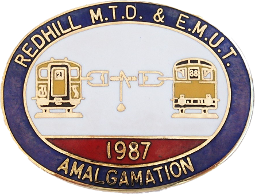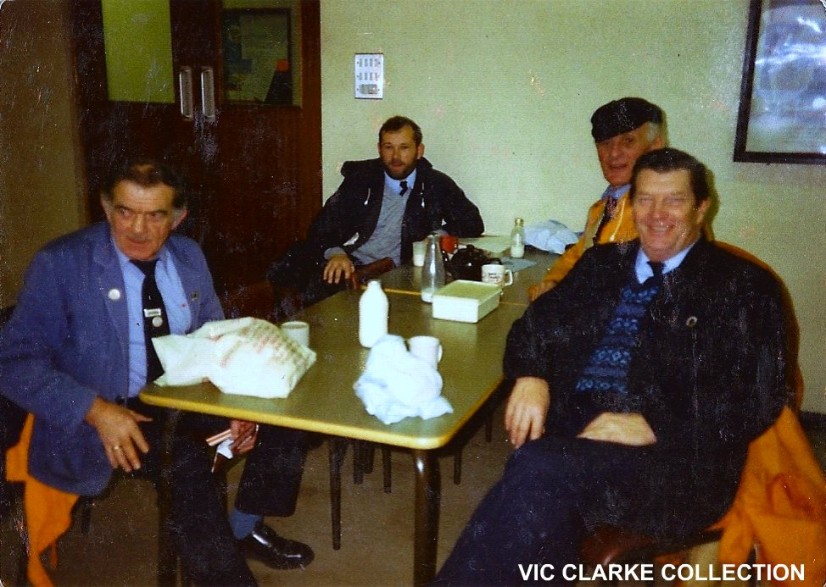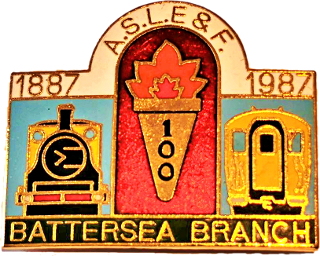
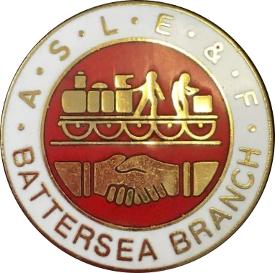
EASEMENT OF MANNING AGREEMENT
On the 17th January, 1987, saw the implementation of the Easement of Manning Agreement and the revision to the 1965 manning agreement. This removed the requirement for a second man on light engine movements and, indeed, a second man only provided in exceptional or safety requirements.
A.S.L.E.& F., at local level, managed to protect some of their work on depots, utilising the Secondmen for coupling and uncoupling duties; their workload and requirements were, however, drastically reduced.
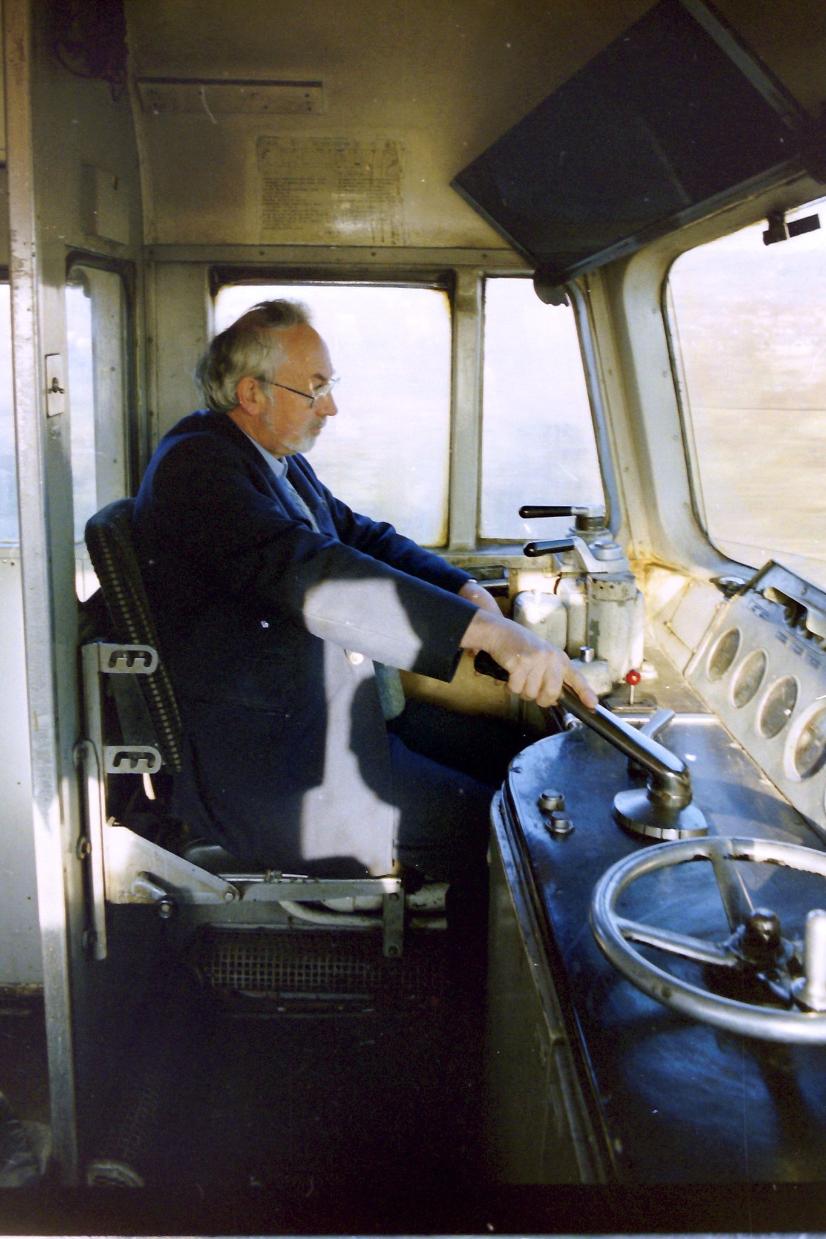
COLIN EASTON COLLECTION
Brighton MT Driver
Peter Staniford
on a class 33 working the Brighton to Salisbury
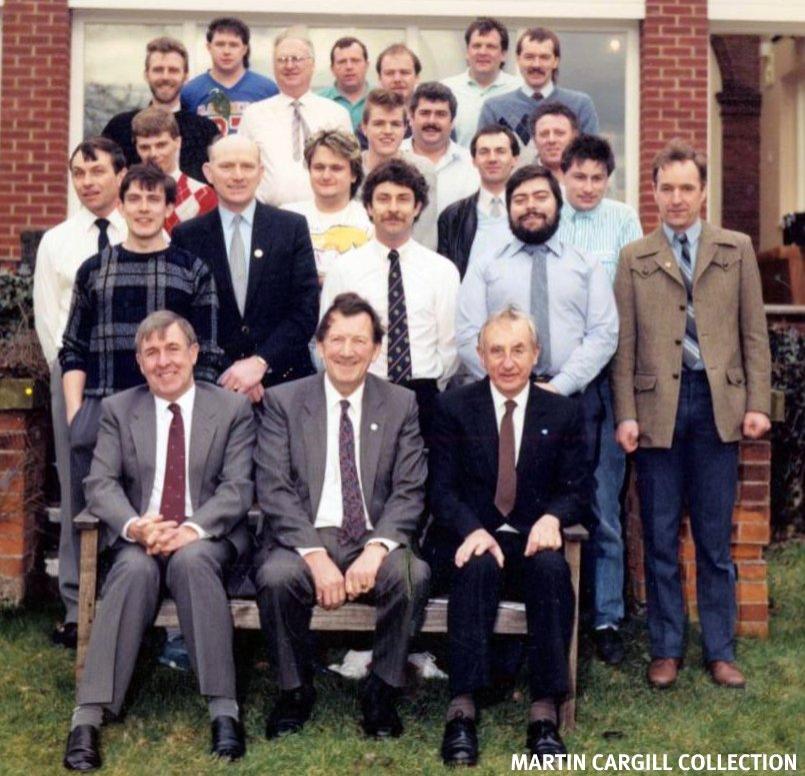
ASLEF National School March 1987
Eastbourne Branch Secretary Tony Harper
(3rd row from the front, second right (next to Graham Morris London Bridge Branch).
LOCOMOTIVE JOURNAL
MAY 1987
TRAINCREW CONCEPT
The British Railways Board’s proposals for the introduction of a new line of promotion under the heading of Traincrew Concept should be most fervently resisted by our Executive Committee.
The prospect is of a line of promotion where Drivers are recruited from other grade members whose duties can only be described as on train general labourer and part time ticket examiner, and who will act as Driver’s Assistant on the few turns for which the footplate manning agreement (such as it now is) requires double manning.
This I am sure is a move which the majority of our members do not want.
Although any realistic member of our Society would not dispute the fact that the majority of trains today are capable of being worked with only a driver in the cab, this does not reduce the need for that person to have had a fair practical grounding in footplate work a requirement which can only be met by some form of Driver Assistant.
There is also the worrying aspect of future promotion to Driver being decided by “suitability, performance and examination”, and lastly “taking into account an applicant’s seniority” a management charter to undermine our negotiating rights by the selective promotion of non union members, scabs etc.
Finally there is the attack on our established PT&R arrangements, and we all know how much the BRB would like to get its hand on them.
So come on, let us call an end to the sellouts of recent times and show that being a footplateman and member of the A.S.L.E.F is something of which we are rightly proud and which we will not give up easily.
MARK BLIZZARD
DRIVER
NORWOOD JUNCTION
LOCOMOTIVE JOURNAL
MAY 1987
TROUBLE AHEAD
I wish to draw attention to an article in the London Daily News recently which carried the headline “Smash the A.S.L.E.F. militants”.
The whole article was based on the issue of the recent disputes on the Southern and a preliminary report by the Monopolies Commission on Network South East.
For those of you know nothin about this report I can tell you that it will be far from pretty reading and, although it is directed at the Network, you can be sure that its recommendations will be taken up over the whole country.
The report calls not for the disbandment of the Sectional Councils, as in Traincrew Concept, but also the complete disbandment of LDCs and the setting up of local representatives (i.e. one man only) to represent men in a whole area.
Furthermore it suggest that individual employees could go to their local managers to deal with problems.
Although the Commission’s proposals have not been adopted by the B.R.B. yet, it is becoming all too obvious on the Network that management, at Regional level at least, is already trying to restrict the workings of LDCs.
Colleagues, it is my feeling that BRB will try to implement the report at national level and so I urge you take this up with your Executive Committee members before you find yourselves in our position on the Southern.
One other message. This is for all the “Wingers”, those who sit in the lobbies forever moaning and complaining about the EC, the Branch or the LDC but never do anything about what they say is wrong.
I say this to them; if you do not stop moaning and start doing, by the time you need us we might just not be around, then you will see how quick this management is to help you.
KEVIN SEALE
SELHURST LDC
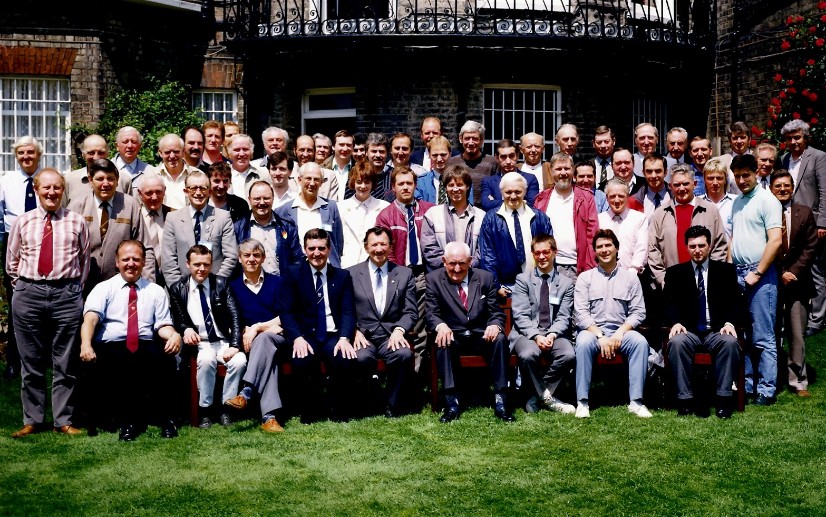
ASLEF COLLECTION
This was Ray Buckton's last A.A.D. before retiring.
This photo features four future General Secretaries of A.S.L.E.F.
Derrick Fullick, Lew Adams, Mick Rix & Keith Norman.
The picture also features delegates from the District No. 1 area:
Back row centre Bill MacKenzie (Brighton), far left Tony Allen (T.W.W.), right Graham
Morris (London Bridge) right Jim Rowe (Basingstoke), Ray Cooper, (Orpington (fifth along
from Tony Allen), Cliff Asserman, (Ramsgate (3 more along), Paul Wightman, (Fratton (third
left of Bill Mackenzie) & Melvin Cox, (Waterloo/Nine Elms, (left of Graham Morris).
LOCOMOTIVE JOURNAL
MAY 1987
NAIL IN THE COFFIN
In 1982 we lost the battle against Decision 77 and we never even bother ed to fight against Decision 92.
Now we have have to put the message across to our members that the coffin containing what’s left of our conditions, and maybe the Society itself, is about to have the final nail struck in and be buried if Traincrew Concept is accepted.
District secretaries should organise open meetings with Executive Committee members in attendance.
Branches should invite EC members to leave their ivory tower and attend their branch meetings; then they might understand why we don’t either need or want Traincrew Concept.
So come on A.S.L.E.F., get your propaganda machine into action before the BRB this time.
I. PALMER
DRIVER
NORWOOD LDC
LOCOMOTIVE JOURNAL
JULY 1987
JOINT BRANCH MEETINGS ON THE SOUTHERN
When I read the letter in the May issue of the Journal from Bro. I. Palmer of Norwood LDC. I ask whether his letter was directed to all District Secretaries and Executive Committee Members or just those from the other Regions. Our own District Secretary has called meetings at Waterloo, Brighton, Faversham and Eastleigh to discuss RSNT Decision 92. When the Traincrew Concept document was released to Branches he held further meetings at Waterloo, Faversham, Brighton and Eastleigh.
At all these meetings Executive Committee Member J. Davis was in attendance and although he got a rough reception at the Decision 92 meetings he still came. All of these meetings have been held over the last few months so I feel that Bro. Palmer should be more specific in his letter as Derrick Fullick and John Davis have certainly been out in the field leading from the front on this issue and the letter from a Southern man does them an injustice.
Arising from the meetings held by our District Secretary, some of the Branches and LDC members who took the trouble to attend felt there was a need for all of the Branches on the Southern to liaise so many joint meetings were held to discuss the serious issues that now confront Locomen. Dispute situations at Selhurst and many other depots have been averted at the last minute and we have had the lads at Grove Park, Waterloo, and Gillingham out on the street over the way Management tried to ride roughshod over National Conditions of Service.
One of the main points is the attitude of British Rail since Decision 92 on the rights of an LDC to scrutinise alterations to the agreed diagrams. What about Appendix Part 1, Clause 4, of the Machinery of Negotiation under the heading of Function? It says (Including Local Rosters, Working Diagrams, and Matter Arising therefrom). Decision 92 only took away the right to scrutinise Special Workings. It did not take away our National Conditions of Service or The Machinery of Negotiation. I agree with Brother Palmer on the serious repercussions that the Traincrew Concept will have on our fraternity if it is introduced as published by the British Rail Board but I will not go into the many issues involved here. Come to the meetings that are being called on your Region by your colleagues. I would particular appeal to our younger members to attend as it is their future at stake as well as A.S.L.E.F.
BOB BLACK
BRANCH SECRETARY
SELHURST
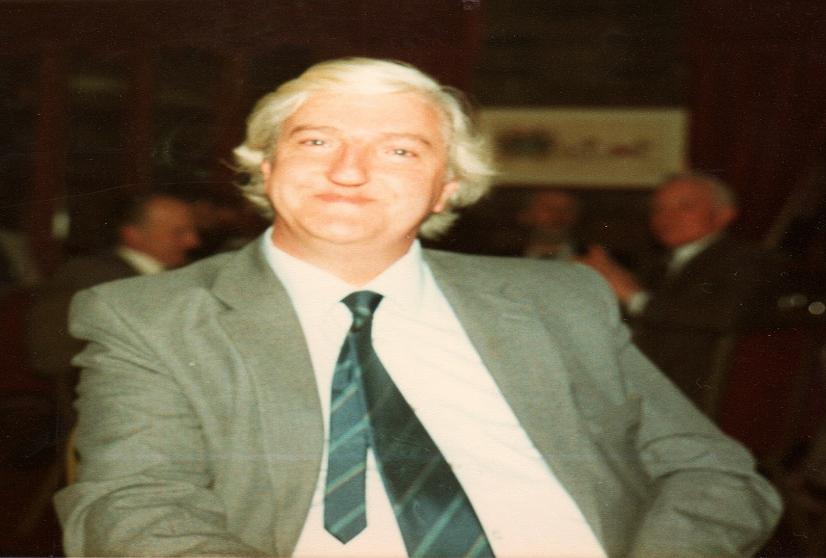
LOCOMOTIVE JOURNAL
JULY 1987
EASTBOURNE BRANCH
It is with sad regret that I have to report the death of Brother Brian Haggar who passed away in hospital on Sunday 21 June at the age of 40.
Brian became ill two years ago and fought a long hard battle to keep going. In spite of the distressing treatment he underwent he always managed to put a brave face on it all. He will be missed by all of his friends and colleagues at Eastbourne, they extend deepest sympathy to his wife and daughter.
A. HARPER
BRANCH SECRETARY
TONY HARPER COLLECTION
TONY HARPER BRANCH SECRETARY c 1985
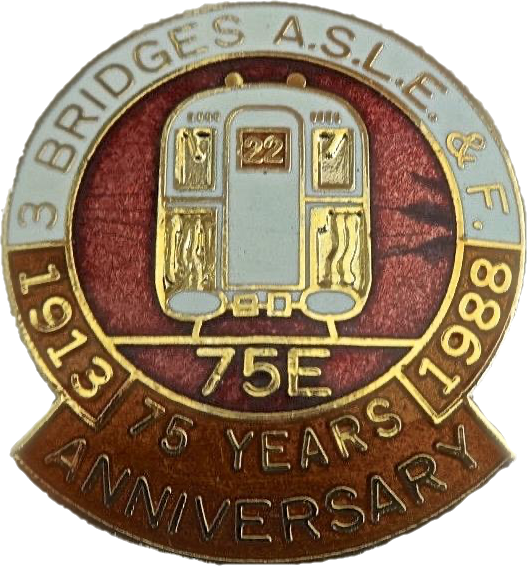
LOCOMOTIVE JOURNAL
AUGUST 1987
THREE BRIDGES ANNIVERSARY BADGE
A Three Bridges A.S.L.E.&F. 75 year anniversary badge is soon to be produced. The complete profits will go to a local Hospice in Crawley which is currently in very financial difficulties. The badge will cost £3.00 each plus p&p., and will come in two colours, each colour limited to 50 badges. Full details from
D. ABRAHAMS
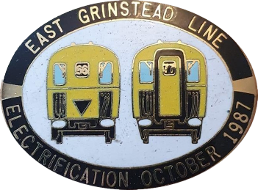
On the 5th October 1987, the South Croydon to East Grinstead line was electrified. The line between Hurst Green Junction to Uckfield remained unnelectrified.
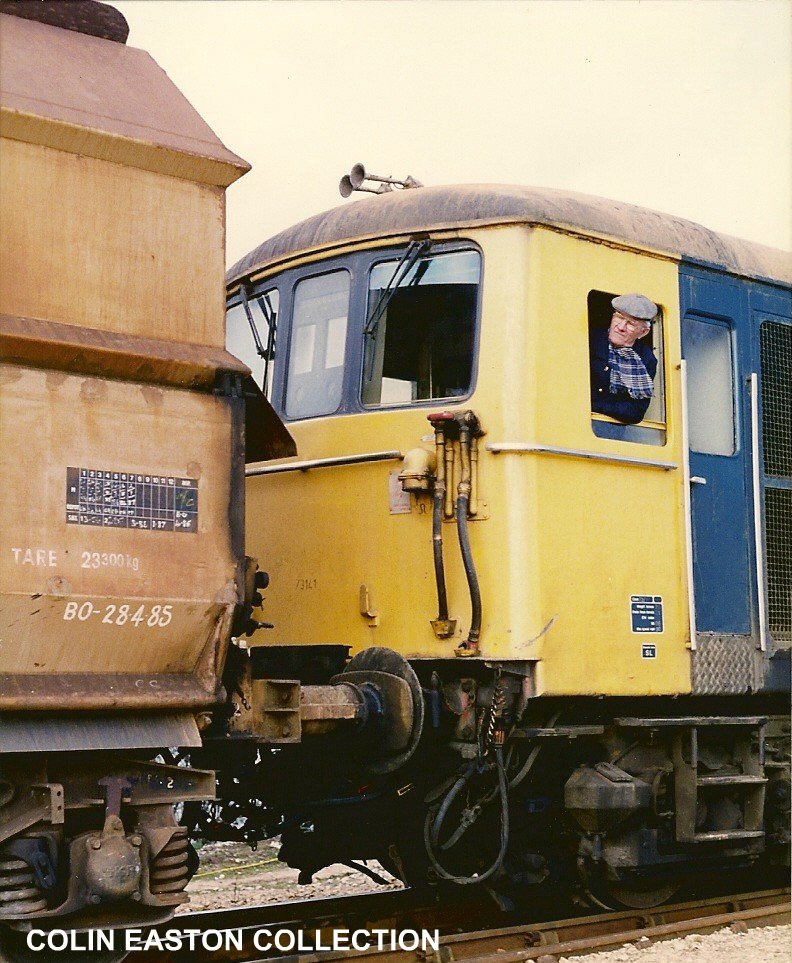
Brighton MT Driver George Hever 22.11.1948
